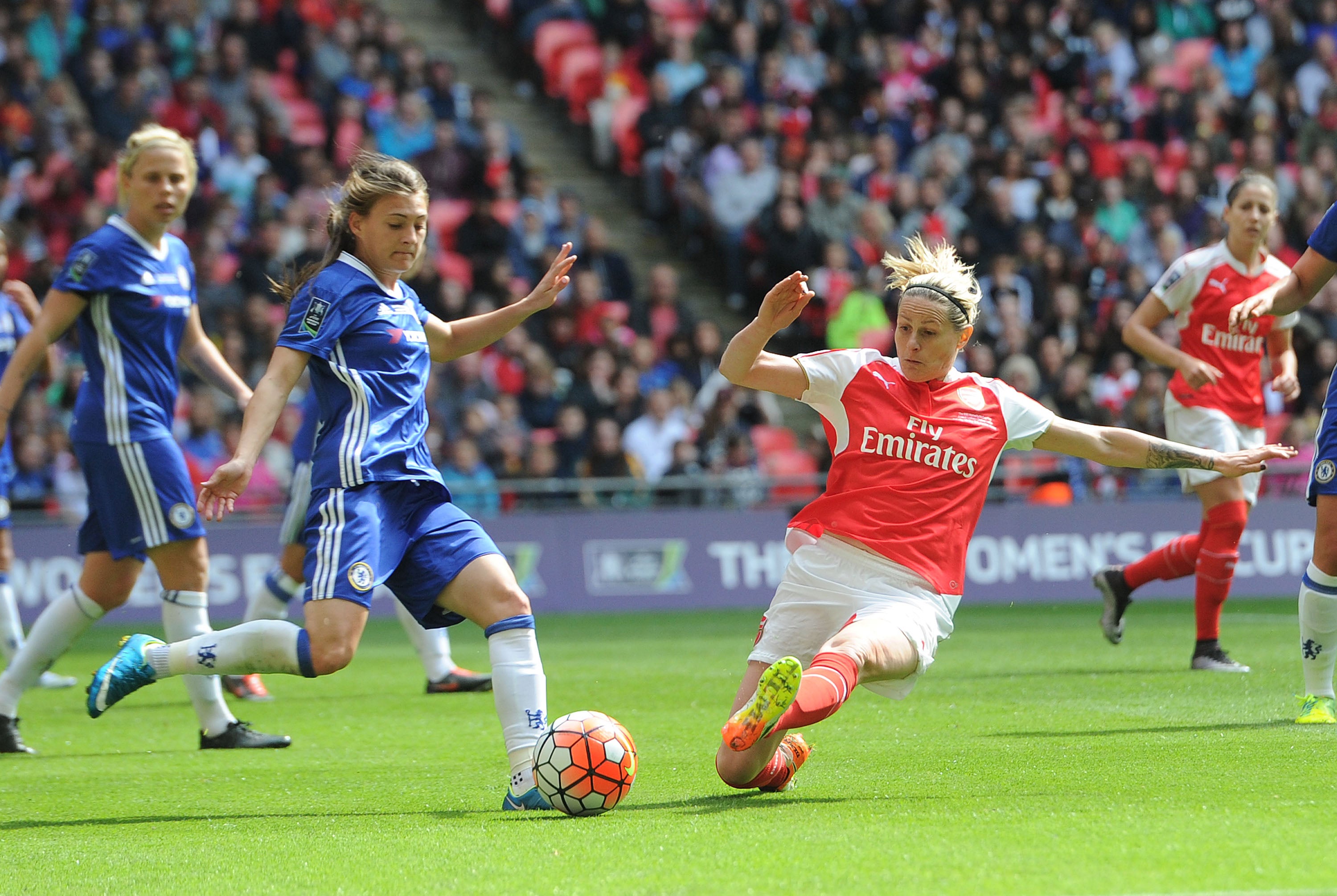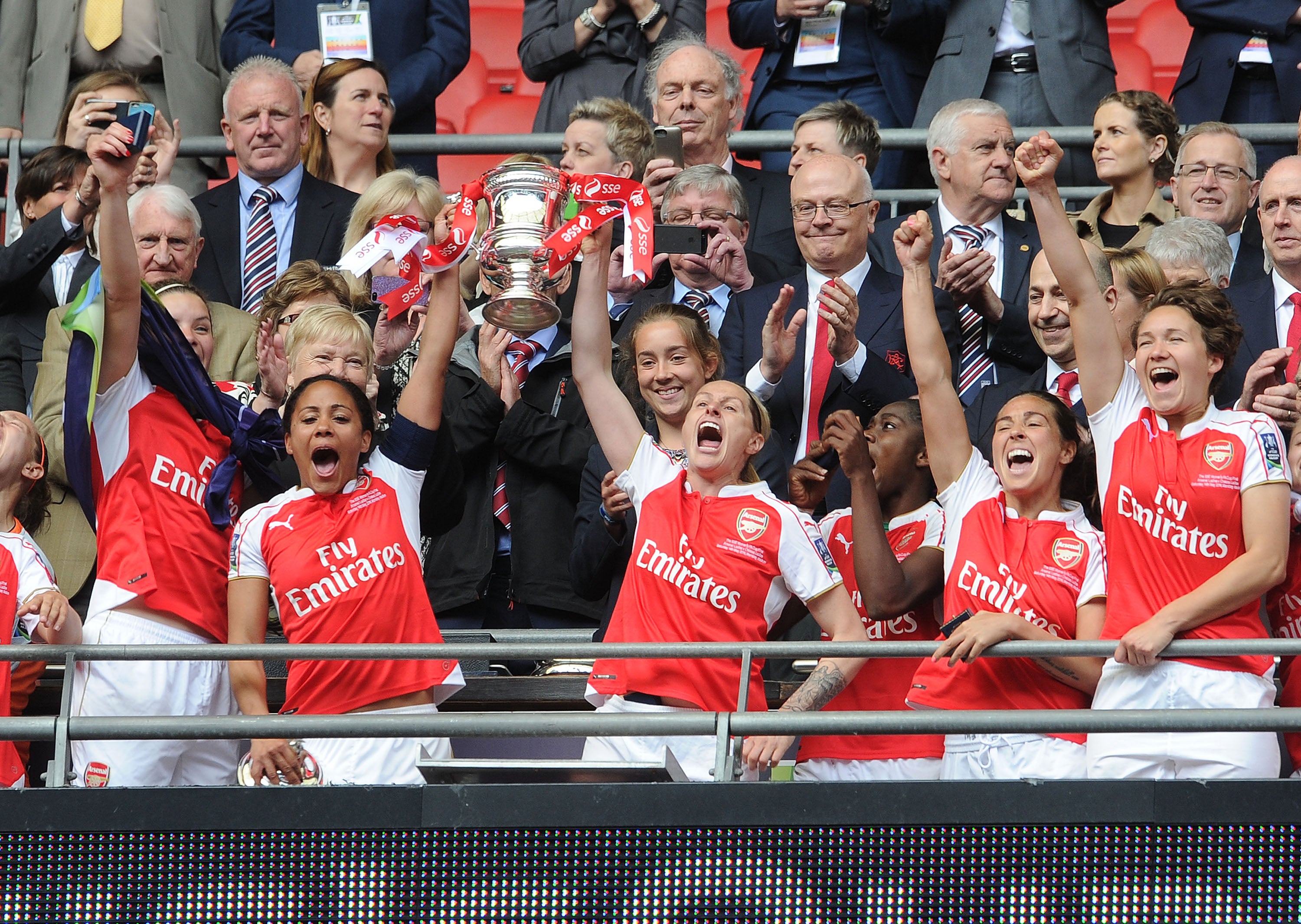Kelly Smith: Key weekend in women’s football offers a chance for pioneer to look back – and to the future
Exclusive: Former England and Arsenal forward speaks to The Independent about a fixture she knows intimately, as well as the next steps for the women’s game

Kelly Smith is working this weekend as part of the coverage of Bristol City against Tottenham Hotspur in the Barclays FA Women's Super League. But she made sure to get Sunday off.
Come 2.30pm, she will be on her couch ready to shout the house down as her former club Arsenal square off against defending champions Chelsea in a fixture she knows all too well.
There will be a sense of pride. Smith was no doubt a trailblazer for women’s football during the 2000s when the sport had to fight tooth and nail for the pitiful coverage it received. She, thanks largely to 117 England caps (along with 46 goals), was arguably the country’s most famous female player. And without her work, along with others’, the WSL would not be where it is today. Notably, on mainstream television. “The best league in the world, if not now then in the next few years,” according to Smith.
Will there also be a hint of “if only”? Smith’s strength along with a typical striker’s dash, all working around a dextrous left-foot, would suit the modern game. She admits to just a whiff of jealously, not only for those who are playing now but given those she might play with and against. Notably, Vivianne Miedema, who Smith reckons has everything you could ever want in a footballer.
Read more: How England became the place to be in women’s football
“There’s definitely a part of me that thinks I want to play in this league,” Smith tells The Independent. “All the top talent are now here. It’s mouth-watering to think of the people now playing in it: Sam Kerr, Alex Morgan, Sam Mewis, Valerie Gauvin, Tobin Heath. All at the top of their national teams. Worldwide stars. And they’re all here.
“I’d love to have pit my wits against them.” Smith pauses for a moment. “But I don’t think I could do it now at 42, mind. My knees wouldn’t let me. Or my ankle!”
Smith was the kind of era-spanning player that makes it hard to nail down a definitive “start” to her career. A senior debut came in 1994 for Wembley Ladies, while her first taste of professionalism required her to skip across the Atlantic to join New Jersey Lady Stallions in 1999.
The end definitively came at the start of 2017 when, at 38, she called time on a journey that took her to four league titles, a Uefa Cup and plenty of memories against Chelsea.
“I always saw that as our big game, Arsenal-Chelsea. I’m sure the rivalry is greater now because they’ve been competing for years for silverware. Certainly when I played the tackles were flying in from everywhere. The concentration would be there. You could tell the focus and energy levels were higher. It was always a must-win game. A lot of the players hated each other, and the teams did, too, when you got over that line.

“Our record at the time was always very good. I think the last time I played against them was the FA Cup final at Wembley in 2016.”
Even superficially, Sunday’s encounter has much going for it. North versus west London, second against third, two sides who have won three WSL titles each. You have the best striker on the planet, and the competition’s all-time leading goalscorer, Miedema, against challengers to her crown in the game’s most expensive signing, Penille Harder, and Australia superstar Kerr. All overseen by two coaches, Joe Montemurro and Emma Hayes, who have seen and won more than most. Hayes, though, has had the better of it between the two, winning all of the previous six meetings.
But this weekend is bigger than this fixture, as vaunted as it may be. Saturday’s opener sees up-and-coming league leaders United take on established force City in the Manchester derby, followed by a Midlands bout between Aston Villa and Birmingham City.
Not for the first time, the WSL is using a weekend free of domestic men’s football to put their best foot forward, aided by broadcast companies such as BT Sport, who are going the extra mile by making Manchester United against Manchester City available for all on YouTube.
“It’s great to have these weekends that we all talk about,” beams Smith. “It’s massive that we’ll be able to watch them on our screens as well. There’s all this top talent that it’s important to put them on show.”
There are two sides to this. More talent produces a better spectacle. But it also takes the game forward collectively. The adage of getting better by playing better opponents has become a key fundamental of the WSL, especially as progress varies across the league given the disparity when it comes to resources and, thus, professionalism.
“I remember some games I used to play in where you knew you had won before you stepped over the line. You knew there was a mental edge because we were ‘Arsenal’ and were unbeatable at times. It was a little bit less exciting. Now, it looks like any team can beat anybody.”

The key now is the next step. Such weekends do the game good, but sustaining the product means continuing its evolution. Standing still and admiring how far women’s football has come is counter-productive, even if there is much to admire.
Over the last week alone there has been plenty of evidence suggesting there is still much to do. From Greg Clarke’s comments that the lack of women’s goalkeepers was due to girls not liking the ball being kicked at them, to a number of female players being prohibited from training during lockdown because the majority of their academies are not classified as “elite”, while boys’ academies are.
Clarke resigned from his post as chairman of the FA, but ridding the system of antiquated views is much easier than correcting antiquated small print. Smith, while disappointed by recent events, is cautiously optimistic, and at the heart of some necessary changes.
Smith is part of the FA Girls Football Schools Partnership, which is looking to bring together schools committed to the growth and development of girls’ football. Assisted by Barclays, with whom Smith is a football ambassador, the scheme is looking to ensure greater resources and equipment across the board with the aim to ensure opportunities for girls are on par with boys by 2024.
“I think back to my time – I played with boys and didn’t have much opportunity to be in a girls’ team at a young age. But that equal access is vital, and it’s not just about creating the next generation of stars. It’s about inspiring them and keeping them involved in the game: as a journalist, videographer or via other avenues.”
Amid the Covid-19 pandemic, weekends like this are a godsend for the game. But it is this kind of work behind the scenes, and the continued drive of those like Smith, that will ensure even better weekends lie ahead for women’s football.
This weekend get a £10 free bet with Betfair, when you bet £10 on a Same Game Multi on the Premier League. Terms: Min £10 Same Game Multi bet on any EPL match this Fri - Sun. Free bet valid for 72 hours, awarded at bet settlement. Excludes cashed out bets. T&Cs apply.
Subscribe to Independent Premium to bookmark this article
Want to bookmark your favourite articles and stories to read or reference later? Start your Independent Premium subscription today.




Join our commenting forum
Join thought-provoking conversations, follow other Independent readers and see their replies
Comments